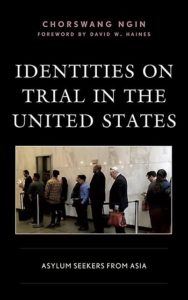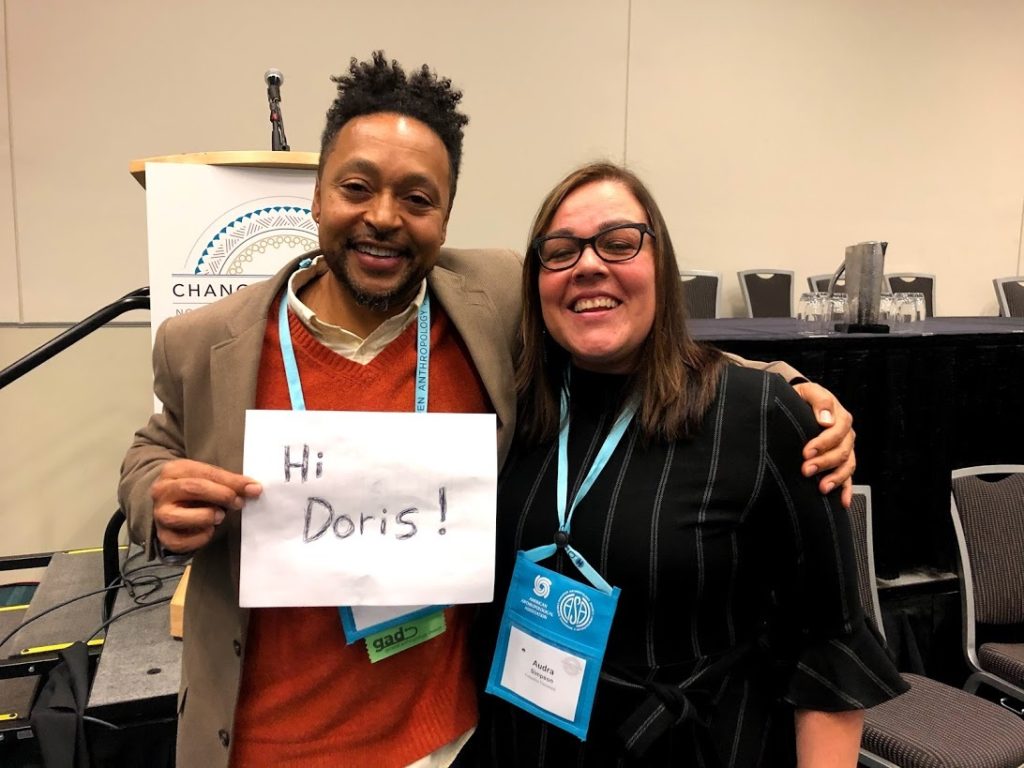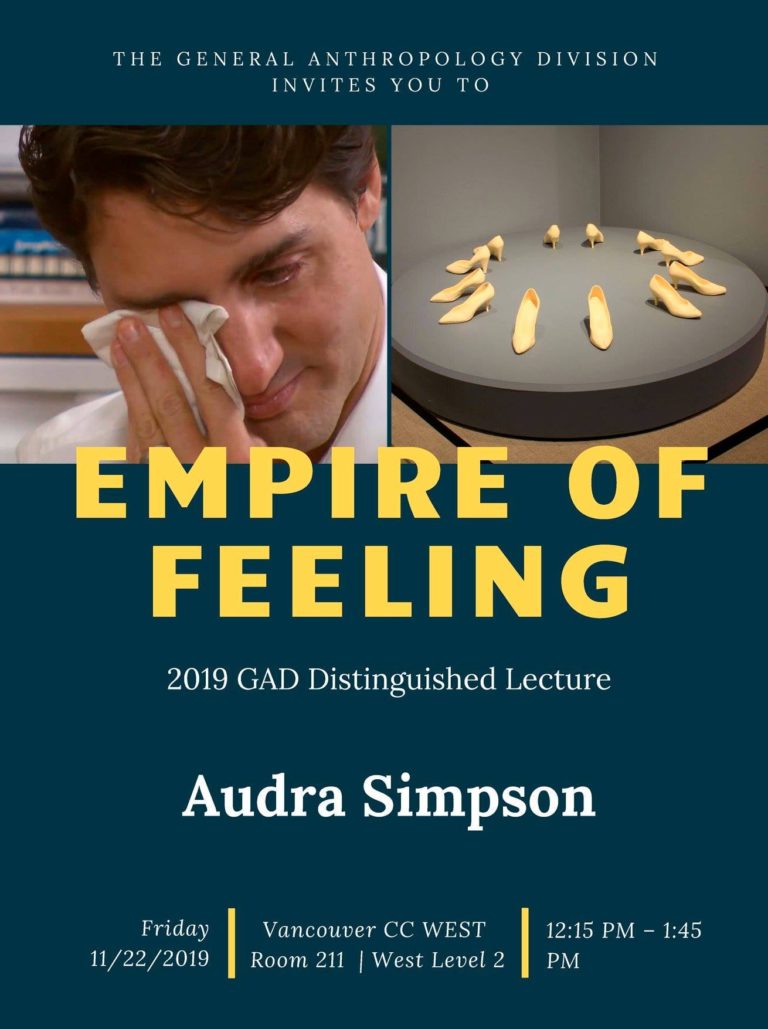GAD Distinguished Lecture
Each year the General Anthropology Division invites a prominent individual in the broad field of anthropology to deliver an address at the AAA meetings. GAD has hosted a distinguished lecture at the AAA annual meetings since 1995. Past distinguished lecturers include Laura Nader, Stanley Tambiah, Lila Agu-Lughod, Bruno Latour, and Jonathan Marks.
 2023 GAD Distinguished Lecture by Damani J. Partridge
2023 GAD Distinguished Lecture by Damani J. Partridge
University of Michigan
American Anthropological Association Annual
Meeting, Toronto, Ontario, Canada

Friday, November 17, 8:30-9:30 pm
* Reception and GAD awards to follow *
Location: Metro Toronto Convention Centre
Blackness as a Universal Claim: Holocaust Heritage, Noncitizen Futures, and Black Power in Berlin
In this bold and provocative talk based on his book of the same title (University of California Press, 2022), Damani J. Partridge examines the possibilities and limits of a universalized Black politics. Young people in Germany of Turkish, Arab, and African descent use claims of Blackness to hold states and other institutions accountable for their everyday struggle. Partridge tracks how these youth invoke the expressions of Black Power, acting out the medal-podium salute from the 1968 Olympics, proclaiming “I am Malcolm X,” expressing mutual struggle with Muhammad Ali and Spike Lee, and standing with raised and clenched fists next to Angela Davis. Partridge also documents the demands by public-school teachers, federal-program leaders, and politicians that young immigrants account for the global persistence of anti-Semitism as part of the German state’s commitment to antigenocidal education. He uses these stories to interrogate the relationships among European Enlightenment, Holocaust memory, and Black futures, showing how noncitizens work to reshape their everyday lives. In doing so, he demonstrates how the concept of Blackness energizes, inspires, and makes possible participation beyond national belonging for immigrants, refugees, Black people, and other People of Color.
 2022 GAD Distinguished Lecture by ChorSwang Ngin
2022 GAD Distinguished Lecture by ChorSwang Ngin
California State University Los Angeles
American Anthropological Association Annual Meeting, Seattle Washington
 Friday, November 11, 8:30-10:00 pm
Friday, November 11, 8:30-10:00 pm
* Reception and GAD awards to follow *
Location: Sheraton Hotel – Jefferson
Who Has Permission to Write and Teach What?
Cultural Expertise on “Race” in the American Courtroom and Anthropology
The complexity and enduring problematics of issues related to the idea of race are evident in the daily news of contestation and debate around the teaching of race, critical race theory (CRT) and programs for diversity, equity, and inclusion (DEI). Who has permission to write and teach on these contentious topics? What gives an anthropologist cultural expertise on questions of race?
ChorSwang Ngin, professor of anthropology and founder of the Asian and Asian American Studies Program at California State University, Los Angeles, will deliver the 2022 distinguished lecture of the General Anthropology Division. Ngin is a cultural anthropologist whose research focuses on connections among the topics of race, ethnicity, and culture. This lecture draws on her experience testifying in American courtrooms, providing cultural expertise on “race” and verifying persecution on the basis of “race” for asylum seekers from Asia. Lessons from these cases lead Ngin to argue for disarticulating the idea of race from racism and employing the idea of racialization to examine racism, while abandoning completely the idea of race. She also proposes a shift from “race” to a host of alternative terms and concepts with a focus on positionality and relationality.
Ngin’s work as a cultural expert, applying anthropology in asylum cases is the basis of her book
Identities on Trial in the United States (Lexington Books, 2018).
2019 GAD Distinguished Lecture by Audra Simpson
 Audra Simpson presented the 2019 GAD Distinguished Lecture entitled Empire of Feeling. Dr. Simpson is a political anthropologist whose work is focused on contextualizing the force and consequences of governance through time, space and bodies. Her research and writing is rooted within Indigenous polities in the US and Canada and crosses the fields of anthropology, Indigenous Studies, American and Canadian Studies, gender and sexuality studies as well as politics. Her recent research is a genealogy of affective governance and extraction across the US and Canada.
Audra Simpson presented the 2019 GAD Distinguished Lecture entitled Empire of Feeling. Dr. Simpson is a political anthropologist whose work is focused on contextualizing the force and consequences of governance through time, space and bodies. Her research and writing is rooted within Indigenous polities in the US and Canada and crosses the fields of anthropology, Indigenous Studies, American and Canadian Studies, gender and sexuality studies as well as politics. Her recent research is a genealogy of affective governance and extraction across the US and Canada.
Her book, Mohawk Interruptus: Political Life Across the Borders of Settler States (2014, DUP) won the Sharon Stephens Prize (AES), the “Best first Book Award” (NAISA) as well as the Lora Romero Award (ASA) in addition to honorable mentions. It was a Choice Academic Title for 2014. In 2010, she won the School of General Studies “Excellence in Teaching Award.”

2018 GAD Distinguished Lecture by
Ruth Behar
This year’s Distinguished Lecture was by award-winning Cuban-American anthropologist and writer Professor Ruth Behar of the University of Michigan.
“Anthropology and the Search for Home: Reflections of an Immigrant Ethnographer.”
Pico Iyer has said that, in our time, “home has less to do with a piece of soil than a piece of soul.” Behar’s lecture addressed the complex topic of what home signifies in our era of massive displacement. Delving into her own immigrant story and her ethnographic journeys to Spain, Mexico, and Cuba, Behar reflected on the complex ways that vulnerability informs her work and spoke about the current immigration crisis and its meaning for anthropology.
2017 Distinguished Lecture Bonnie Nardi
“Why I Haven’t Learned to Stop Worrying and Love the Bomb, or Anthropological Observations on the Political Economy of Digital Technology.”
2016 Distinguished Lecture Regna Darnell
Regna Darnell gave the 2016 GAD Distinguished Lecture, Who Was Franz Boas? How Do We Know? And Why Should We Care? (PDF) on the Franz Boas Papers Project and the cultivation of indigenous partnerships to recontextualize the material that is an ongoing part of it at the 115th Annual Meeting of the American Anthropological Association, Minneapolis, Nov. 18, 2016.
2015 Distinguished Lecture Jonathan Marks
Jonathan Marks, Professor of Anthropology at University of North Carolina at Charlotte, gave the GAD Distinguished Lecture at the 114th Annual Meeting of the American Anthropological Association, Denver, Nov. 20, 2015.
2014 Distinguished Lecture Richard Kurin
Dr. Richard Kurin, Under Secretary for History, Art and Culture, Smithsonian Institute, gave the 2014 GAD Distinguished Lecture in Washington, D.C., December 5, 2014.
2013 Distinguished Lecture
Bruno Latour gave the GAD Distinguished Lecture at the AAA annual meetings in Chicago, November 22, 2013.
2012 Distinguished Lecture
Richard Klein gave the GAD Distinguished Lecture at the American Anthropological Association Annual Meetings in San Francisco, Nov. 16, 2012
2011 Distinguished Lecture
Richard Borshay Lee gave the GAD Distinguished Lecture at the American Anthropological Association Annual Meeting in Montreal, Quebec, November 18, 2011.
- 2010 Karen Strier (University of Wisconsin, Madison), “Why Anthropology Needs Primatology.” General Anthropology 18 (1): 1, 6-8, Spring, 2011.Bruno Latour (left), Jonathan Marks (center), Regna Darnell (right)
- 2009 Tim Ingold (University of Aberdeen), “Anthropology Comes to Life,” General Anthropology 17(1):1-4, Spring
- 2008 Claire Smith (Flinders University), “Archaeologists in Action: Collaboration, Inclusion, and Engagement.”
- 2007 Panel Discussion: Yolanda Moses, Jane Edwards, Kiran Cunningham, Joseph Kinsella, Debra Picchi, Jennifer Creamer, Hilary Kahn, Susan Sutton, Jim Peacock, “Campus Internationalization and the Anthropological Voice.”
- 2006 William Durham (Stanford University), “The Elephant in the Room: Evolution in Anthropology,” General Anthropology 14(2):1-7, September 2007.
- 2005 Margaret Lock, (McGill University), “Rethinking Ourselves: The Molecular Body and the Eclipse of Nature/Nurture” “Living with Uncertainty: The Genetics of Late Onset Alzheimer’s Disease,” General Anthropology 13(2): 1, 6-9, Fall, 2006.
- 2003 Lila Abu-Lughod, (Columbia University), “Ethnography in/of Nations” General Anthropology 10(2): 1-4, March 2004.
- 2002 Rayna Rapp, (New York University), “Cell Life and Death, Child Life and Death: Genomic Horizons, Genetic Disease, Family Stories.”
- 2001 Adam Kuper (Brunel U, London School of Economics), “Incest, Cousin Marriage, and the Origins of Anthropology.”
- 2000 Chris Stringer (Natural History Museum, London), “The Evolution of Modern Humans: Where Are We Now?” General Anthropology 7(2): 1-5, Spring 2001.
- 1999 Jean Clottes (French Ministry of Culture), “Chauvet Today,” General Anthropology 6(2): 1-8, Spring, 2000.
- 1998 Stanley Tambiah (Harvard Univeristy), “Aspects of Transnational Movements and Diaspora Communities.”
- 1997 Sherry Ortner ((University of California, Los Angeles), “Anthropologists in a Media-Saturated World.”
- 1996 Milford H. Wolpoff (University of Michigan) “Australopithecus: A New Look at an Old Ancestor,” Bulletin of the Council for General Anthropology 3(1): 1-7, Fall, 1996; Pt. 2, 3(2): 1-5, Spring 1997.
- 1995 Laura Nader (University of California, Berkeley) “The Phantom Factor: Impact of the Cold War on Anthropology.” “Postscript on the Phantom Factor-More Ethnography of Anthropology,” General Anthropology 4(1): 1, 4-8, Fall, 1997.b
